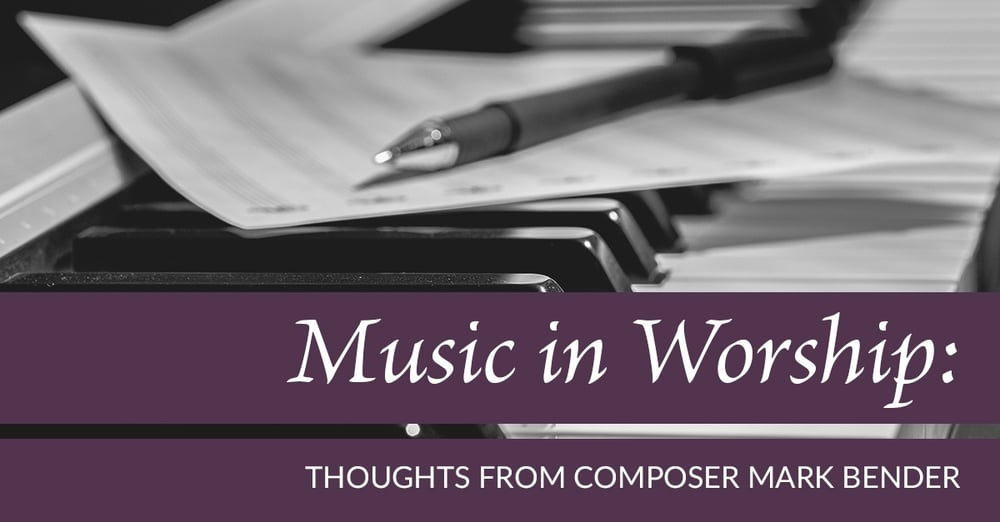Having served on the committee that created Lutheran Service Book and being a church music director, Mark Bender has a complex understanding of how music functions in the Divine Service. Mark also has published more than a dozen compositions with CPH Music. Hear from Mark himself about how he chooses music for worship and what tools he recommends to his fellow music directors.
Tell us about your work as the music director at St. Paul’s Lutheran Church.
As minister of music at St. Paul’s, my responsibilities span the musical life of our church and our Lutheran school. It is a wonderful blessing to be able to serve both and influence, in a coordinated manner, the musical growth and spiritual life of the parish. In our school I teach music education classes (grades 5–8), direct our school choir (grades 5–8), prepare materials and lead the music for our chapel services, and carry out other activities and responsibilities as needed.
In our church I meet with our pastors to plan worship services, direct the adult choir, serve as one of the main organists, and coordinate and oversee the congregation’s music ensembles and other activities, including our Music at St. Paul’s annual series of special services and concerts.
What’s important to you as you select music for use in the Divine Service?
Providing music in the Lutheran tradition means, foremost, that the texts are in accord with Holy Scripture, confess the faith we hold, and clearly proclaim the Gospel. The music that serves these texts must be equal to the task: complementary, not overshadowing or drawing attention to itself, and sensitive to the overall culture of the local congregation. The Church Year calendar and its appointed biblical pericopes in the lectionary, together with the liturgy being employed, also determine the choice of music for the service. Subsequently, the hymns and the music of the choir, organ or piano, handbells, and other instruments should unite to support the theme of the day.
How does the work of CPH support you as a parish musician?
As the official publishing arm of the LCMS, CPH strives “to be the premier publisher and provider of choice for products and services that are faithful to the Scriptures and the Lutheran Confessions.” This vision is evident in the products and services that flow from her music department. The resources are of high quality and musical integrity. I can select CPH music without concern that the texts are doctrinally unsound, espouse heterodox theology, or represent popular trends inconsistent with our worship practice.
The annual Worship Planning Book is a valuable tool used by our pastors and parish musicians. It links the Church Year and its lectionary to the specific day in the secular calendar. The appointed readings, the Collect of the Day, the overall theme of the day, hymn suggestions, and CPH music for small or large choirs, children, organ, piano, and handbells are included. A Divine Service planning outline for the specific day’s worship is provided.
I encourage you to make CPH your premier publisher and provider of choice for music and all other products and services. The CPH Music website is an easy way to browse the extensive catalog of music products, get assistance, and place orders.
Do you have any favorite recent choral titles (or keyboard)?
I want to highlight the Hymn Prelude Library. This twelve-volume set contains an organ setting for every hymn tune in Lutheran Service Book. Each of the preludes was composed specifically for this series. The settings in this collection are practical and useful within the Divine Service. The technical requirements of the player are from easy to medium in difficulty. Pedaling and other skills are of a modest nature. Every congregation using Lutheran Service Book should have a set of the Hymn Prelude Library available for her parish organists. A similar twelve-volume set containing piano settings is being prepared!
You’ve been chairman of the Commission on Worship of The Lutheran Church—Missouri Synod and a member of the Liturgy Committee of the Lutheran Hymnal Project. Between these roles and your work as music director, you have had a lot of experience with Lutheran Service Book. Do you have any advice on how to get the most out of the hymnal?
Use it. Trust it. Familiarize yourself with the hymns and liturgies, as well as the tools in the front and back of the book. Continue to unpack its treasures. (The LSB Concordance is a handy resource for searching specific words in hymn texts.) Consider implementing a Hymn of the Month in your congregation (and school). Repetition on a weekly basis will help your congregation grow into the text of the hymn. This is a good way to teach an unfamiliar hymn.
Use the liturgies. Consider repetition underscoring the seasons of the Church Year by using one Divine Service setting throughout a season and then changing to another setting for the next season. This keeps the settings fresh and gives the congregation opportunities to expand her liturgical repertoire.
Now that you’ve heard about Mark Bender’s music philosophy, it’s time to explore his compositions.













